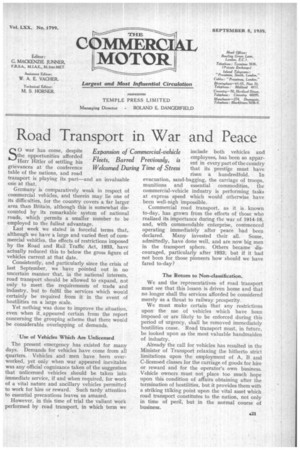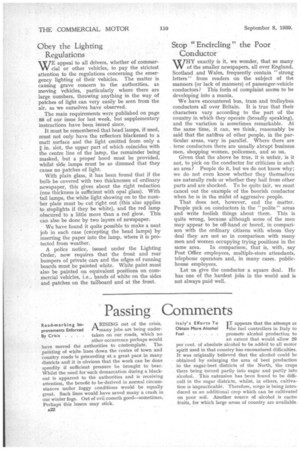Road Transport in War and Peace
Page 23

Page 24

If you've noticed an error in this article please click here to report it so we can fix it.
S0 war has come, despite the opportunities afforded Herr Hitler of settling his grievances at the conference table of the nations, and road transport is playing its part—and an invaluable one at that.
Germany is comparatively weak in respect of commercial vehicles, and therein may lie one of its difficulties, for the country covers a far larger area than Britain, although this is somewhat discounted by its remarkable system of national roads, which permits a smaller number to be employed to the fullest advantage.
Last week we stated in forceful terms that, although we have a large and varied fleet of commercial vehitles, the effects of restrictions imposed by the Road and Rail Traffic Act, 1933, have actually reduced this to below the gross figure of vehicles current at that date.
Consistently, and particularly since the crisis of last September, we have pointed out in no uncertain manner that, in the national interests, road transport should be allowed to expand, not only to meet the requirements of trade and industry, but to fulfil the services which would certainly be required from it in the event of hostilities on a large scale.
Yet nothing was done to improve the situation, even when it• appeared certain from the report concerning the grouping scheme that there would be considerable overlapping of demands.
Use of Vehicles Which Are Unlicensed The present emergency has existed for many days. Demands for vehicles have come from all quarters. Vehicles and men have been overworked, yet only when war appeared inevitable was any official cognizance taken of the suggestion that unlicensed vehicles should be taken into immediate service, if and when required, for work of a vital nature and ancillary vehicles permitted to work for hire or reward. Such tardy attention to essential precautions leaves us amazed.
However, in this time of trial the valiant work performed by road transport, in which term we include both vehicles and employees, has been so apparent in every part of the country that its prestige must have risen a hundredfold. In evacuation, sand-bagging, the carriage of troops, munitions and essential commodities, the commercial-vehicle industry is performing tasks at express speed which would otherwise have been well-nigh impossible.
Commercial road transport, as it is known to-day, has grown from the efforts of those who realized its importance during the war of 1914-18, and, with commendable enterprise, commenced operating immediately after peace had been declared. Many invested their all. Some, admittedly, have done well, and are now big men in the transport sphere. Others became couraged, particularly after 1933; but if it had not been for those pioneers how should we have fared to-day?
The Return to Non-classification.
We and the representatives of road transport must see that this lesson is driven home and that no longer shall the services afforded be considered merely as a threat to railway prosperity.
We must make certain that any restrictions upon the use of vehicles which have been imposed or are likely to be enforced during this. period of urgency, shall be removed immediately hostilities cease. Road transport must, in future, be looked upon as the most valuable handmaiden of industry.
Already the call for vehicles has resulted in the Minister of Transport relaxing the hitherto strict limitations upon the employment of A, B and C-licensed classes for the carriage of goods for hire or reward and for the operator's own business. Vehicle owners must not place too much hope upon this condition of afrairs obtaining after the termination of hostilities, but it provides them with 'a striking talking point upon the vital asset which road transport constitutes to the nation, not only in time of peril, but in the normal course of business.
Obey the Lighting Regulations
WE appeal to all drivers, whether of commercial or other vehicles, to pay the strictest attention to the regulations concerning the emergency lighting of their vehicles. The matter is causing grave concern to the authorities, as moving vehicles, particularly where there are large numbers, throwing anything in the way of patches of light can very easily be seen from the air, as we ourselves have observed.
The main requirements were published on page 88 of our issue for last week, but supplementary instructions have been issued since.
It must be remembered that head lamps, if used, must not only have the reflectors blackened to a matt surface and the light emitted from only a in. slot, the upper part of which coincides with the centre line of the lamp, the remainder being masked, but a propet hood must be provided, whilst side lamps must be so dimmed that they cause no patches of light.
With plain glass, it has been found that if the bulb be covered with two thicknesses of ordinary newspaper, •this gives about the right reduction (one thickness is sufficient with opal glass). With tail lamps, the white light showing on to the number plate must be cut right out (this also applies to stoplights if they be white), and the red lamp obscured to a little more than a red glow. This can also be done by two layers of newspaper.
We have found it quite possible to make a neat job in each case th (excepting a e head lamps) by inserting the paper into the lamp, where it is protected from weather.
A police notice, issued under the Lighting Order, now requires that the front and rear bumpers of private cars and the edges of running boards must be painted white. White paint must also be painted on equivalent positions on commercial vehicles, i.e., bands of white on the sides and patches on the tailboard and at the front.
Stop " Encircling " the Poor Conductor
WHY exactly is it, we wonder, that so many of the smaller newspapers, all over England, Scotland and Wales, frequently contain "strong letters" from readers on the subject of the manners (or lack of manners) of passenger-vehicle conductors? This forin of complaint seems to be developing into a mania.
We have encountered bus, tram and trolleybus conductors all over Britain. It is true that their characters vary according to the part of the country in which they operate (broadly speaking), and the variation is sometimes remarkable. At the same time, it can, we think, reasonably be said that the natures of other people, in the particular areas, vary in parallel. Where there are terse conductors there are usually abrupt business men, shopping women, policemen, and so on.
Given that the above be true, it is unfair, is it not, to pick on the conductor for criticism in such an area? People do it, but we do not know why; we do not even know whether they themselves are naturally rude or whether they hail from other parts and are shocked. To be quite fair, we must cancel out the example of the boorish conductor when he is in the midst of aggressive people. That does not, however, end the matter. People pick on conductors in the " polite " areas and write foolish things about them. This is quite wrong, because although some of the men may appear to be off-hand or bored, in comparison with the ordinary citizens with whom they deal they are not so in comparison with many men and women occupying trying positions in the same area. In comparison, that is, with, say Post Office employees, multiple-store attendants, telephone operators and, in many cases, publichouse employees.
Let us give the conductor a square deal. He has one of the hardest jobs in the world and is not always paid well.




































































